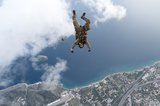Why artificial intelligence has secured its place in special forces’ operations
The diverse use cases of Artificial Intelligence (AI) have been turning it into a critical tool for Special Operations Forces (SOF).
Japan’s new DARPA-style cyber warfare institute will be based in Tokyo. (Photo: Wikimedia Commons/Benh Lieu Song)
Japan’s Ministry of Defense (MoD) is set to launch a DARPA-style research institute focused on cyber warfare in October 2024.
The agency will be government-run with the aim of developing innovative cyber war technologies. DARPA itself has a strong reputation around the world for pushing technological boundaries, running challenges that draw innovation to particular areas of research and developing solutions to problems that hold back whole sectors of industry.
That remit will be mimicked by the Japanese institute which will be based in Tokyo but will focus on the realm of cyber warfare.
Seizing the Future: The Imperative for Militaries to Master AI and Forge Strategic Alliances
The term cyber warfare is often misleading, because it refers to the weaponisation of a previously civilian criminal skillset for military purposes. Cyber attacks in general terms are expected to cost victims a total of US$10.5 trillion in 2025 worldwide, which primarily includes commercial hacking, ransomware and data theft.
Cyber warfare is the use of those same nefarious cyber skills in a dedicated military or semi-military way against the infrastructure of a particular country or countries, to cripple or radically change the political infrastructure of the victim-nation. Everything from crippling hospitals more effectively than any missile could, to hacking democratic elections to achieve results that favour the nation of the attackers counts as cyber warfare. Likewise, the skills and methods employed to negate any such cyber war attacks.
There has been an assumption in some defence quarters that cyber warfare is in no sense equivalent to “hardware”-based warfare, the business of missiles and fighter aircraft, and that it still belongs entirely to the civilian and commercial world of technology battles.
As society becomes increasingly dependent on its technology to function, however, cyber warfare is becoming as relevant as “traditional” warfare. For instance, between January 2022 and November 2023, almost 4,000 cyber attacks were recorded against Ukrainian targets by the Computer Emergency Response Team of Ukraine, a 300% increase on the same period the year before the war. Most of them came from Russia as part of a “cyber front” designed to weaken the country’s infrastructure before and during its invasion of Ukraine.
A more recent example was given by a Microsoft report on August 9 2024 which uncovered an Iranian cyber warfare attack on the 2024 US elections. The report claimed that “an Iranian network known as Storm-2035 continues to operate four websites masquerading as news sites that are actively engaging US voter groups on opposing ends of the political spectrum with polarizing messaging on issues such as the US presidential candidates, LGBTQ rights and the Israel–Hamas conflict”.
Japan’s new Defense Innovation Technology Institute will form part of its five-year plan to strengthen its defence posture against oncoming and evolving threats such as cyber warfare. Other research projects wrapped into the budget for the strengthening of Japan’s defences include electromagnetic warfare, information gathering using satellites and communication interference technology.
“Where military use of cutting-edge civilian technologies is changing the modes of warfare, it is necessary to fundamentally reinforce defence capabilities at an epoch-making speed,” the Japanese MoD explained. Many of the Institute’s initial 100 staff are expected to come from outside the government including experts in cyber warfare, AI and robotics.

The diverse use cases of Artificial Intelligence (AI) have been turning it into a critical tool for Special Operations Forces (SOF).

Polaris Government and Defense has launched the Military 850 TITAN 155 snowmobile ahead of SOF Week 2025. Designed for immediate deployment in cold-weather environments, the platform will enter trials with special operations forces by year-end, targeting NATO’s northern and eastern European members.

Solutions supplied by Adventure Tactical currently equip military and law enforcement forces of 24 countries.

At SOF Week 2025 in Tampa, Florida, Stu Bradin, President and CEO of the Global SOF Foundation (GSOF), underscored the increasing operational demands placed on special operations forces (SOF) as global tensions mount.

All the best images from the penultimate day of Eurosatory 2024 which brought the security industry into sharper focus for attendees to the Parc des Expositions de Villepinte.

The Ukrainian dogs carried out the demonstrations at Eurosatory’s HELPED area which focuses on humanitarian and environmental crises.